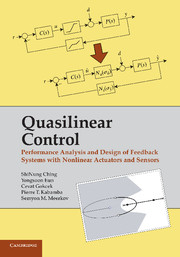 Quasilinear Control
Quasilinear Control Published online by Cambridge University Press: 01 June 2011
Motivation: Analysis of disturbance rejection is intended to quantify the standard deviation of the output in closed loop LPNI systems. Unlike the linear case, the usual Lyapunov equation approach cannot be used for this purpose. Therefore, the first goal of this chapter is to provide a quasilinear method applicable to systems with nonlinear instrumentation. While some results in this direction for SISO systems have been described in Chapter 2, we treat here the MIMO case.
Also, we address the problem of fundamental limitations on achievable disturbance rejection in system with saturating actuators. As it is well known, in linear systems with minimum-phase plants, disturbances can be attenuated to any desired level. Clearly, this can not be the case in systems with saturating actuators. Therefore, the second goal of this chapter is to quantify fundamental limitations on disturbance rejection in closed loop LPNI systems and characterize tradeoffs between the authority of the actuators and the achievable disturbance attenuation.
In addition, we present a method for modeling actuators with rate saturation and show that disturbance rejection analysis in LPNI systems with such actuators can be reduced to that with amplitude saturation.
Overview: A quasilinear method for output standard deviation evaluation in closed loop MIMOLPNI systems is developed. The method consists of a Lyapunov equation coupled with transcendental equations defining the quasilinear gains of actuators and sensors. An algorithm for solving these equations with any desired accuracy is provided.
To save this book to your Kindle, first ensure [email protected] is added to your Approved Personal Document E-mail List under your Personal Document Settings on the Manage Your Content and Devices page of your Amazon account. Then enter the ‘name’ part of your Kindle email address below. Find out more about saving to your Kindle.
Note you can select to save to either the @free.kindle.com or @kindle.com variations. ‘@free.kindle.com’ emails are free but can only be saved to your device when it is connected to wi-fi. ‘@kindle.com’ emails can be delivered even when you are not connected to wi-fi, but note that service fees apply.
Find out more about the Kindle Personal Document Service.
To save content items to your account, please confirm that you agree to abide by our usage policies. If this is the first time you use this feature, you will be asked to authorise Cambridge Core to connect with your account. Find out more about saving content to Dropbox.
To save content items to your account, please confirm that you agree to abide by our usage policies. If this is the first time you use this feature, you will be asked to authorise Cambridge Core to connect with your account. Find out more about saving content to Google Drive.